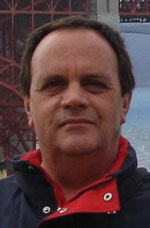PFP: The Portuguese railway cluster
Posted: 6 September 2016 | | No comments yet
In 2015 eight Portuguese companies working in the railway sector decided to join forces to form the Portuguese Railway Platform (Plataforma Ferroviária Portuguesa – PFP) with one belief in mind: that working together is more productive. In this article José Carlos Clemente, Head of International Technology Development at IP – Infraestruturas de Portugal, SA., explains the origins and evolution of the partnership and shares the value that it hopes to bring to the industry.


PFP is largely the result of acknowledging an opportunity created by the need to group and structure a relatively dispersed set of railway industry skills. These skills range from both the scientific and technological areas, as well as the industrial field, however there appears to be a lack of critical mass and weak levels of stable and lasting collaboration.
Why create a railway cluster?
There were several reasons why the railway cluster was created, such as:
- To strengthen the competitiveness of the sector
- To create critical mass for skills development
- To create synergies; encouraging cooperation between businesses
- To promote efficiency in the participation of projects
- To promote a strong image of the sector, both internally and externally
- To promote networking.
There is a considerable number of research and development (R&D) activities in the Portuguese railway sector including an expressive participation in Euro pean and national projects.
PFP stands as a key element to strengthen the competitiveness of the Portuguese railway sector thro ugh technological development and innovation, as is the case in other Euro pean countries such as Spain (Spanish Railway Technology Platform) and other sectors in Portugal (e.g. aero nautics and health).
Motivation
Research, technological development and innovation play key roles in the strengthening of competitiveness, economic growth and employment.
Today rail transportation has a greater social and economic importance involving a set of strategic issues of relevance, in particular: improvement of mobility and intermodality in order to foster a modal rebalancing, modernisation and expansion of the network; and improvement of operating costs ensuring safety, interoperability and environmental sustainability.
It, therefore, becomes crucial to have a clear definition of the priorities of research, development and innovation, scheduled and resourced for the rail sector as a basis for sustainable development in view of com petitiveness and growth.
This is the primary aim of the Portuguese Railway Platform (PFP); to connect the different actors and stakeholders around a common vision and a framework for development of technologies, products and services to the sector with the aim of increasing national competitiveness in the railway domain.
PFP has assigned itself the ambition to be a Technological Cluster structured with a strategy of innovation and internationalisation in the context of the different funding instruments at European and National level.
Vision
The development of the railway sector is considered to be one of the priority means of addressing the challenge of mobility of people and goods. It also aligns with the ambitions and vision set out in the transport white paper published by the European Commission in 2011 and with the objectives of the strategic plan for transport and infrastructure approved by the Portuguese government.
In the long-term the main objective of the railway system focuses on its attractiveness and the satisfaction of its customers. The system needs to remove several barriers and attain the following:
- Available 24/7 infrastructure: reliable, resilient, safe and sustainable
- Optimised capacity: intelligent maintenance and asset management – providing benefits, low cost and reduced risk
- Traffic management and optimisation of operations in order to satisfy the requirements of passengers and freight
- Sustainable and efficient energy solutions with low levels of carbon emission
- Integrated services with other modes of transport. Continuous door-to-door services
- A railway network with greater flexibility for freight operators
and logistics.
Innovation is the driving force behind PFP and its related industry sector, for the creation, implementation and subsequent promotion of products and solutions of high added value, both in the national and international context.
PFP members
In order for PFP to be effective it must mobilise in a balanced way all railway stakeholders: regulatory institutions, industry and the scientific system. Furthermore, the principles of openness, transparency and inclusiveness must always be observed. PFP identifies the following types of members that would be welcomed:
- Railway infrastructure managers
- Public and private railway undertakers
- Industry – large, medium and small companies covering the whole supply chain of components, equipment and subsystems
- Public transport authorities and operators
- Transport and logistics operators
- The financial sector
- Research institutions and promoters of interface relations between universities and industry
- Civil society, including users and consumers, ensuring the effective involvement of future customer needs.
Given the complexity and the scope of objectives PFP should also remain open to the benefits of potential alliances with other similar platforms and associations at the international level.
PFP structure
Flexibility and simplicity are two fundamental characteristics to be observed in the supporting structure of PFP. The structure should ensure a balance between the interests of all groups of participants and follow the concept of networking, including mechanisms to facilitate the activities of existing networks.
PFP’s main activities
PFP is committed to carrying out the following main activities:
- Development of a strategic agenda for research and innovation, defining the medium and long-term priorities, including measures
to strengthen the cooperation between the various actors structuring the R&D capabilities in Portugal. As a result this will detail several research roadmaps for thematic areas, as well as their execution and implementation strategies - Development of mechanisms to mobilise private and public funds required for the development and implementation of R&D strategies. Exploit the synergies between the structural funds and the framework programmes of the European Commission in the
area of transport. PFP should explore and establish with the financial sector mechanisms of debt and equity financing for the implementation of R&D activities - Identify the challenges and activities related to opportunities for training and education to ensure qualified and prepared human resources for the future implementation of the technologies, products and services expected in the medium and long-term
- Establish a stable on-going process of communication, seeking a wider dissemination of R&D products to society, whilst always discussing with the various agents and authorities the priorities and needs for to focus on in the rail sector.
Technological and scientific aspects
As a support to the rail community PFP will analyse the extent to which the proposed research activities represent the acquisition of new knowledge (advanced technology) that subsequently contributes to competitiveness through new products, processes and services with cost-effective increased efficiencies, ensuring a close correspondence between the expected results of the investigation and the response to future market needs.
The inclusion in the strategic agenda of road maps with milestones and measurable results, drawn upon programmes, projects, and collaborative networks will guarantee the integration of efforts and avoid fragmentation and duplication.
Economic and societal benefits
PFP will support and help to build business strategies for the sector; both economic and societal:
- Innovation aspects include specific markets, consolidated business strategies, creation of new services
- New markets, job creation and higher business volumes. Business plans involving technological and economic issues
- Effort levels for scientific and technological developments compared with the scale of the potential socio-economic benefits
- Contribution to sustainable development objectives
- Increased mobility and accessibility, passengers with reduced mobility
- Punctuality, frequency and costs
- Environmental impacts.
Integrating themes for projects of a collective and collaborative nature
To provide greater support to foster conditions for competitiveness and innovation, PFP should anticipate and welcome the following crosscutting aspects:
- Research and open innovation and exploitation of results in partnership
- Internationalisation and insertion into global markets
- Knowledge transfer and sustained collaboration
- Support for business.
For this purpose PFP has identified eight integrating themes, aligned with the European strategies for R&D, that seek to boost the creation of oriented project ideas, establishing potential consortia to bid for National and European funding. PFP also encourages cooperation between industry, the scientific community, technological systems and the end-users, to undertake innovative projects that aim to supply new products and services to the railway sector. The areas in which PFP seeks to stimulate innovation are:
- Rolling stock
- Attractiveness of the railway system
- Command, control and communications
- Intelligent and sustainable infrastructure
- Energy efficiency
- Freight
- Testing, homologation and interoperability
- Knowledge management.
PFP can host its own dynamics of consortia around specific products and technologies and also identify downstream mobilising business projects and structures to enhance the technological and market readiness levels.
Summary
In short, PFP will ensure the following for the railway community:
- Key result: strategic research and innovation agenda
- Shared vision and active participation of all relevant stakeholders
- Identification of challenges for the transport sector related to growth, competitiveness and sustainable development where research and technological development can have an impact in the medium and long-term
- Added value for the country and for the regions
- The size and technical complexity of the R&D projects requires higher levels of collaboration, thereby obtaining critical mass competences
- The high intensity collaborative research as a forerunner to a future market uptake
- Identify potential markets for the relevant technologies in the medium and long-term
- Anchor initiatives: open innovation, internationalisation, sustained collaboration, business support
- Mobilising public and private financial resources
- Training, communication and dissemination.
Reference
Biography


José Carlos Clemente is a Civil Engineer and structural and railway specialist. He has worked for the railways since 1982 as a Bridge/Tunnel Manager, Director of Rail Engineering and Head of Innovation and Knowledge. José is currently Head of International Technology Development at IP – Infraestruturas de Portugal, SA. Other current positions include Chairman of EUROC (the European Rail Operating Community Consortium); Associated Member of the Shift2Rail Joint Undertaking; Vice-President of the Portuguese Railway Platform (PFP); and President of APNCF – the Portuguese Association for Rail Standardisation and Certification. Founding Members of PFP Associate Members of PFP PFP encourages cooperation between industry, the scientific community, technological systems and the end-users


